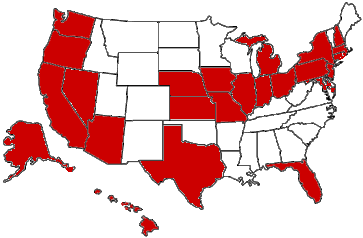The federales ended their unlicensed broadcast enforcement activity with a whimper last year, apparently taking the month of December off completely. The entirety of 2013 saw 249 FCC enforcement actions, a slight reduction from 2012 levels.
 Overall, the FCC was active against pirate stations in 24 states and the District of Columbia, and more than 90% of those stations involved were on the FM band. The vast majority of enforcement activity was concentrated on the coasts, with New York and New Jersey being the hottest spots for pirates—as evidenced by the major sweep the FCC did there in July. (For what it’s worth, there’s been no material change in the number of FM frequencies occupied by interlopers on my own radio dial here in Brooklyn.)
Overall, the FCC was active against pirate stations in 24 states and the District of Columbia, and more than 90% of those stations involved were on the FM band. The vast majority of enforcement activity was concentrated on the coasts, with New York and New Jersey being the hottest spots for pirates—as evidenced by the major sweep the FCC did there in July. (For what it’s worth, there’s been no material change in the number of FM frequencies occupied by interlopers on my own radio dial here in Brooklyn.)
FCC enforcement activity remains almost wholly administrative. 90% of it involved station-visits and the issuance of warning letters. Since most stations are the target of at least that minimal amount of attention, the number of stations actually contacted by the FCC tops out around 100. However, the agency’s penchant for inflating these statistics remains in full effect: a gym in Washington state got four warning letters for each mini-FM transmitter plugged into its television sets; a guy in California running three transmitters got a separate warning letter for each one.
A dozen fines were issued to pirates in 2013, totaling nearly $140,000—a significant decline from 2012. In this regard, the wheels of justice still grind quite slowly: the last fine handed out in 2013 went to a pirate the agency first opened a case on in 2009.
State-level anti-pirate laws don’t appear to be making much of a dent, either. Just four arrests between New York and Florida, taking down a total of three stations.
As always, the name of the game is relative risk—and the better you can assess it, the easier it actually becomes to flip a transmitter-switch.
Skip to content